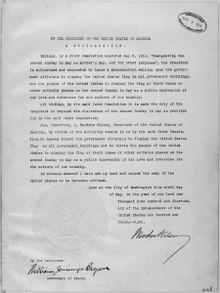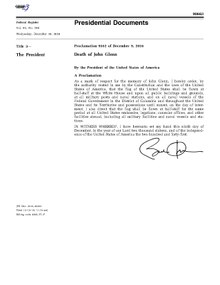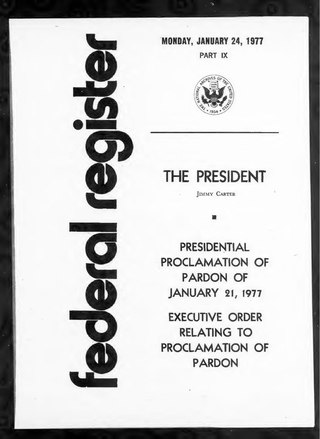


A presidential proclamation is a statement issued by a US president on an issue of public policy and is a type of presidential directive.



A presidential proclamation is a statement issued by a US president on an issue of public policy and is a type of presidential directive.
A presidential proclamation is an instrument that:
Proclamations issued by the president fall into two broad categories:
Unless authorized by the US Congress, a presidential proclamation does not have the force of law. If an Act of Congress is passed that would take effect upon the happening of a contingent event, and the president later proclaims that the event happened, the proclamation would then have the force of law. [3]
Presidential proclamations are often dismissed as a practical tool for policy making because they are considered to be largely ceremonial or symbolic. [3] The administrative weight of these proclamations is upheld because they are often specifically authorized by congressional statute, making them "delegated unilateral powers". Their issuances have occasionally led to important political and historical consequences in the development of the United States. George Washington's Proclamation of Neutrality in 1793 and Abraham Lincoln's Emancipation Proclamation in 1863 were some of America's most famous presidential proclamations in that regard. [4] The legal weight of presidential proclamations suggests their importance to presidential governance. [5]
Other more recent policy-based proclamations have also made a substantial impact on economic and domestic policy, including Bill Clinton's declaration of federal lands for national monuments and George W. Bush's declaration of the areas affected by Hurricane Katrina as disaster areas.
Proclamations are also used, often contentiously, to grant presidential pardons. Recent notable pardon proclamations are Gerald Ford's pardon of former President Richard Nixon (1974), [6] Jimmy Carter's pardon of Vietnam War draft evaders (Proclamation 4483, 1977), [7] and George W. Bush's clemency of Scooter Libby's prison sentence (2007). [8]
Although less significant in terms of public policy, proclamations are also used ceremonially by presidents to honor a group or situation or to call attention to certain issues or events. For instance, George H. W. Bush issued a proclamation to honor veterans of World War II, and Ronald Reagan called attention to the health of the nation's eyes by proclaiming a Save Your Vision Week and issued Proclamation 5497, which recognized National Theatre Week.

The president of the United States (POTUS) is the head of state and head of government of the United States of America. The president directs the executive branch of the federal government and is the commander-in-chief of the United States Armed Forces.

In the United States, an executive order is a directive by the president of the United States that manages operations of the federal government. The legal or constitutional basis for executive orders has multiple sources. Article Two of the United States Constitution gives presidents broad executive and enforcement authority to use their discretion to determine how to enforce the law or to otherwise manage the resources and staff of the executive branch. The ability to make such orders is also based on expressed or implied Acts of Congress that delegate to the president some degree of discretionary power. The vast majority of executive orders are proposed by federal agencies before being issued by the president.
Imperial presidency is a term applied to the modern presidency of the United States. It became popular in the 1960s and served as the title of a 1973 book by historian Arthur M. Schlesinger, Jr., who wrote The Imperial Presidency to address two concerns: that the presidency was uncontrollable and that it had exceeded its constitutional limits. According to professor of political science Thomas E. Cronin, author of The State of the Presidency, the imperial presidency is a term used to define a danger to the American constitutional system by allowing presidents to create and abuse presidential prerogatives during national emergencies. This was based on: (1) presidential war powers vaguely defined in the Constitution, and (2) secrecy – a system used that shielded the Presidency from the usual checks and balances afforded by the legislative and judicial branches.
A pardon is a government decision to allow a person to be relieved of some or all of the legal consequences resulting from a criminal conviction. A pardon may be granted before or after conviction for the crime, depending on the laws of the jurisdiction.

Gerald Ford's tenure as the 38th president of the United States began on August 9, 1974, upon the resignation of president Richard Nixon, and ended on January 20, 1977. Ford, a Republican from Michigan, had been appointed vice president since December 6, 1973, following the resignation of Spiro Agnew from that office. Ford was the only person to serve as president without being elected to either the presidency or the vice presidency. His presidency ended following his narrow defeat in the 1976 presidential election to Democrat Jimmy Carter, after a period of 895 days in office.
The powers of the president of the United States include those explicitly granted by Article II of the United States Constitution as well as those granted by Acts of Congress, implied powers, and also a great deal of soft power that is attached to the presidency.
A plenary power or plenary authority is a complete and absolute power to take action on a particular issue, with no limitations. It is derived from the Latin term plenus, 'full'.
The Office of the Pardon Attorney assists the president of the United States in his exercise of executive clemency as authorized by Article II, Section 2, of the US Constitution. It is part of the United States Department of Justice and is in consultation with the Attorney General of the United States or his delegate.

Gerald Rudolph Ford Jr. was an American politician who served as the 38th president of the United States from 1974 to 1977. He previously served as the leader of the Republican Party in the U.S. House of Representatives from 1965 to 1973, and as the 40th vice president under President Richard Nixon from 1973 to 1974. Ford succeeded to the presidency when Nixon resigned in 1974, but was defeated for election to a full term in 1976. Ford is the only person to serve as president without winning an election for president or vice president.

The Presidential Records Act (PRA) of 1978, 44 U.S.C. §§ 2201–2209, is an Act of the United States Congress governing the official records of Presidents and Vice Presidents created or received after January 20, 1981, and mandating the preservation of all presidential records. Enacted November 4, 1978, the PRA changed the legal ownership of the President's official records from private to public, and established a new statutory structure under which Presidents must manage their records. The PRA was amended in 2014, to include the prohibition of sending electronic records through non-official accounts unless an official account is copied on the transmission, or a copy is forwarded to an official account shortly after creation.
The Scooter Libby clemency controversy arose when U.S. President George W. Bush commuted the prison sentence of Scooter Libby, the former Chief of Staff to Bush's vice president, Dick Cheney, on July 2, 2007. It resulted in a hearing, "The Use and Misuse of Presidential Clemency Power for Executive Branch Officials", held July 11, 2007, by the full Committee on the Judiciary of the U.S. House of Representatives. The hearing was intended to "explore the grave questions that arise when the Presidential clemency power is used to erase criminal penalties for high-ranking executive branch employees whose offenses relate to their work for the President", as well as to assess the consequences of the perjury and obstruction of justice of which vice-presidential Chief of Staff Lewis Libby was convicted March 6, 2007.

Proclamation 4311 was a presidential proclamation issued by President of the United States Gerald Ford on September 8, 1974, granting a full and unconditional pardon to Richard Nixon, his predecessor, for any crimes that he might have committed against the United States as president. In particular, the pardon covered Nixon's actions during the Watergate scandal. In a televised broadcast to the nation, Ford, who had succeeded to the presidency upon Nixon's resignation, explained that he felt the pardon was in the best interests of the country and that the Nixon family's situation was "a tragedy in which we all have played a part. It could go on and on and on, or someone must write the end to it. I have concluded that only I can do that, and if I can, I must."
The president of the United States is authorized by the U.S. Constitution to grant a pardon for a federal crime. The other forms of the clemency power of the president are commutation of sentence, remission of fine or restitution, and reprieve. A person may decide not to accept a pardon, in which case it does not take effect, according to a Supreme Court majority opinion in Burdick v. United States. In 2021, the 10th Circuit ruled that acceptance of a pardon does not constitute a legal confession of guilt, recognizing the Supreme Court's earlier language as authoritative.

Donald Trump signed a total of 570 proclamations from January 2017 to January 2021.
The following is a timeline of the presidency of Gerald Ford from August 9, 1974, when Ford became the 38th president of the United States, upon the resignation of Richard Nixon, to December 31, 1974.

Proclamation 4483, also known as the Granting Pardon for Violations of the Selective Service Act, was a presidential proclamation issued by Jimmy Carter on January 21, 1977. It granted pardons to those who evaded the draft in the Vietnam War by violating the Military Selective Service Act from August 4, 1964, to March 28, 1973. It was implemented through Executive Order 11967.
]